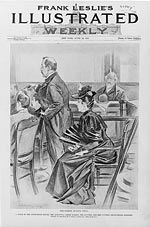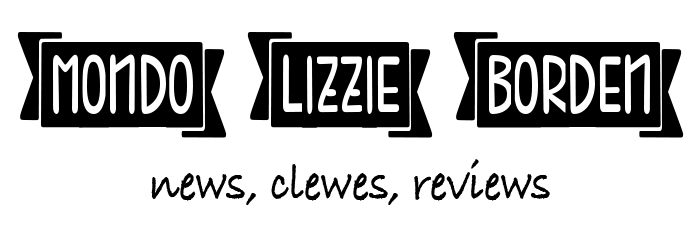Using Lizzie to Make Better Lawyers

An interesting article appeared on the Univeristy of Virginia Law School site that is titled “Using Literature to Make Better Lawyers.”
The Lizzie Borden trial is mentioned prominently in this piece as a useful example of what can be done to inspire learning of the law. An excerpt of the article:
Using Literature to Make Better Lawyers
Denise Forster
FOR YEARS, law professors have woven works of literature—novels, memoirs, short stories, essays—into classes and seminars to tell the stories of law. Using these works, professors and students dissect scenarios not otherwise encountered in traditional legal curricula. A survey of some of the LawSchool’s recent courses follows.
Literature as Gateway
Anne Coughlin says it over and over—there are certain legal spaces where it’s very hard to get information about what’s taking place. To get into those legal spaces, she asserts, “lawyers and law professors almost have to turn to narratives to understand how our system is functioning.â€
Coughlin, the O.M. Vicars Professor of Law and Barron F. Black Research Professor, takes her students inside the workings of a jury by reading Trial By Jury, a Princeton historian’s first-person account of serving as jury foreman in a Manhattan trial. Literature can be a place to turn for empirical data, according to Coughlin, who concedes it may be only anecdotal. “We’re bringing into the Law School a text that’s unconventional in the sense that it doesn’t purport to be doctrinal, it doesn’t purport to be written from the perspective of a legal academic or a legal practitioner. But it does fill in the blanks,†she said.
A prior culture’s norms are the blanks that literature can fill. “We have an intuition that women in the 19th century were harmed by extramarital affairs. Well, how do we know that? There aren’t a whole lot of cases on the books. Most of the facts get handled out of court privately and don’t become law cases. To the extent that there are cases on the books about sex, whether it be consensual or rape, the cases don’t tell you very much because judges won’t write about it. It’s indecent. It’s dirty. It’s unmentionable, so we don’t know a whole lot about it. We certainly don’t have the young woman’s perspective. She’s completely lost as a character, so sometimes the best way is to turn back to fiction. You have to be cautious; this is literature and we must be very careful in our generalizations. But for us to understand how they defined rape or how they defined criminal conversation, we need to know more of the facts.â€
Coughlin co-taught a course, Trials of the Century: Literary and Legal Representations of Sensational Criminal Trials, with former Law School Professor Jennifer Mnookin, studying essays, trial transcripts, memoirs, short stories, films, and novels, and it worked: the class dazzled professors and students alike.
“We took sensational trials that have become part of our cultural repertoire, our cultural canon. We asked ourselves, what is the great lawyer’s work product? We were interested in the cases that changed legal culture and popular culture, so we used cases that themselves are legends in their own time or have become the basis for movies, novels, and plays.â€
The class read portions of transcripts of the Lizzie Borden trial and the lawyers’ arguments, watched a reenactment done by the Stanford Law School, and read a short story about Lizzie. “It was absolutely eye-opening,†says Coughlin, “just riveting in terms of giving you a sense of that hot August day when somebody—we think it was Lizzie Borden, but it was never proved—went and killed Mr. and Mrs. Borden. We were looking for a three-dimensional understanding of that trial in its time and place and its meaning for subsequent generations.â€
The class did the same thing with the Oscar Wilde case, looking at the connection between law and literature. Perhaps the most popular playwright on the planet at that time, Wilde brought a criminal libel action based on his lover’s father’s accusation that Wilde was “posing as a sodomite.†For the purposes of the class, “it was just too good to be true,†says Coughlin. “Wilde takes the stand as a playwright who, of course, writes dialogue; some portions of the transcript of the Oscar Wilde trial read like a play. He is so witty and so funny, but then reality sets in. He can’t control it. He’s no longer the playwright. The lawyers are in control and you can suddenly see Wilde’s story starting to disintegrate as his case falls apart, revealing the truth: not only was he in fact posing as a sodomite, he was having sex with many young men.â€
The class went on to cover the trial of Socrates, and the Scottsboro boys, and was intrigued by the parallels of the contemporary significance of those trials. “Look at Scopes, the evolution question. It’s right back on the table. Look at Oscar Wilde—gay marriage, gay sex. Right back on the table,†says Coughlin. “We all learned so much—and it was a huge help for practical lawyering. We read a lot of lawyers’ works and studied them together systematically and the ways in which they get represented and readdressed. And we read some of the greatest closing arguments of all time. The words of Clarence Darrow just blow you away. These are students who want to litigate and get up on their feet and they have to learn how to perform. Of course, they’re not all going to be trying the trials of the century, but some of them will. These are brilliant students and I just never saw anything like it.â€




